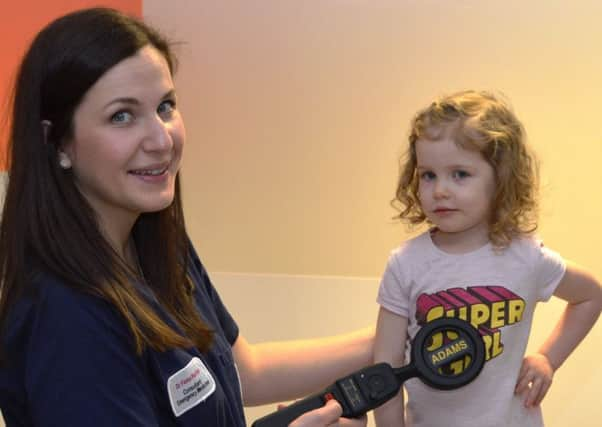Monklands A&E doctors using metal detectors to reduce need for children's X-rays


Clinicians at Monklands Hospital have been using metal detectors to find out if children have swallowed metallic objects.
The idea has proven successful and will now be taken up at NHS Lanarkshire’s other hospitals, Wishaw and Hairmyres.
Advertisement
Hide AdAdvertisement
Hide AdA project assessing the benefits of hand-held metal detectors produced a significant reduction in the need for children to have X-rays after possibly swallowing coins or other metal objects.
Previously, X-rays were needed in 80 per cent of such cases, but the introduction of metal detectors has seen this figure drop to 50 per cent.
The project, informally dubbed Hunting for Swallowed Treasure, was run by emergency department registrar Dr Nicola Moultrie as part of her work towards becoming a consultant.
She said: “Parents and carers sometimes attend with children they think may have swallowed a metal foreign body.
Advertisement
Hide AdAdvertisement
Hide Ad“Normally the children would have one or more X-rays to make sure the object isn’t stuck in their gullet, which can cause potentially fatal complications.
“But the metal detector means they don’t have to go through the possibly upsetting experience of an X-ray examination and they avoid the exposure to radiation that comes with radiography.
“We just run the detector over them, and if it bleeps and the light flashes, we know they have swallowed something metallic. Depending on where it is, some patients can go home without the need for radiological imaging.
Emergency department consultant Dr Fiona Hunter, who supervised Nicola’s project, added: “We were both aware that detectors had previously been used in some emergency departments in Scotland and introducing it to Lanarkshire has been a great success.
Advertisement
Hide AdAdvertisement
Hide Ad“There is the added bonus of the savings from doing fewer X-rays, which are around £55 each.
“The detector costs less than £400 so it has quickly paid for itself.
“It’s a medical grade device and works particularly well for coins although it can be less sensitive to other foreign bodies.
“All the emergency team are trained to use the detector when it is appropriate.”